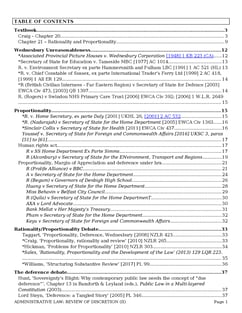R v Devon Health Authority ex parte Coughlan [2000] 2 WLR 622
Judgement for the case R v Devon Health Authority ex parte Coughlan
KEY POINTS
-
In recognizing the doctrine of substantive legitimate expectation, two categories were raised, namely:
When the phrase is used to denote a substantive right: an entitlement that the claimant asserts cannot be denied him; and
When it is used to refer to the claimant’s interest in some ultimate benefit which he hopes to retain (or, some would argue, attain). Here, therefore, it is the interest itself rather than the benefit that is the substance of the expectation.
Citing Lord Scarman, “unfairness in the purported exercise of power can amount to an abuse or excess of power.”
-
In the realm of public law, the Health Authority could only renounce its commitment to Miss Coughlan that Mardon House would be her lifelong residence if there was an overriding public interest that necessitated such a decision.
There was none in this case. Thus, their decision was not justified.
FACTS
In 1993, Miss Coughlan, who had been living in Newcourt Hospital since her accident in 1971, was relocated to Mardon House, along with other patients and most of the staff from Newcourt.
Mardon House was a purpose-built NHS facility designed for young, severely disabled, long-term residential patients. The move was based on the Health Authority's representation that Mardon House was better suited to the patients' needs.
Patients were promised they could live there "for as long as they chose," and nursing care would be provided. However, Mardon House transitioned from being a registered nursing home to an acute clinical treatment facility, no longer admitting new long-term patients from mid-1994.
JUDGEMENT
Appeal dismissed.
COMMENTARY
This case emphasized the importance of upholding legitimate expectations, consulting affected parties, and ensuring that public authorities act fairly and proportionately in their decision-making processes.
ORIGINAL ANALYSIS
Long term patients of health trust agreed to be moved to a new building because they were told they could stay there till they died and wouldn’t have to move again. The health trust decided to close the building later on because it was too expensive to run, and the patients applied for substantive protection of their LE under judicial review, which the court granted.
-
CA said that if a public body exercising a statutory function made a promise as to how it would behave in the future which induced a legitimate expectation of a benefit which was substantive, rather than merely procedural, to frustrate that expectation could be so unfair that it would amount to an abuse of power; that, in such circumstances, the court had to determine whether there was a sufficient overriding interest to justify a departure from what had previously been promise.
This is the balancing exercise of Sedley J in a new form.
Lord Woolf MR
-
There are 3 possible outcomes in assessing how much protection to give to LEs:
The courts may require the PA simply to bear in mind previous representations, so as to avoid Wednesbury unreasonable decisions, giving the representation such weight as they think fit - see ex parte Hargreaves;
The courts may find merely LEs that the parties concerned would be consulted/ allowed to make representations, which will be enforced unless there is some overwhelming policy consideration that merits overriding this, taking into account the demands of fairness; or
“Where the court considers that a lawful promise or practice has induced a legitimate expectation of a benefit which is substantive, not simply procedural, authority now establishes that here too the court will in a proper case decide whether to frustrate the expectation is so unfair that to take a new and different course will amount to an abuse of power. Here, once the legitimacy of the expectation is established, the court will have the task of weighing the requirements of fairness against any overriding interest relied upon for the change of policy.”
----
NB the narrow interpretation of Hargreaves so as to avoid a direct clash - this creates a new problem of deciding whether a case falls into category one or three. Also, rather than introduce a new standard of judicial review-overriding public interest-why not simply use proportionality to achieve a higher degree of protection for substantive expectations.
RELATED CASES
For Further Study on R v Devon Health Authority ex parte Coughlan
Need instant answers? Our AI exam tutor is here to help.
Ask questions 🙋 Get answers 📔 It's simple 👁️👄👁️
Our AI is educated by the highest scoring students across all subjects and schools. Join hundreds of your peers today.
Get StartedSimilar Cases
Related Product Samples
These product samples contain the same concepts we cover in this case.
| Administrative Law | Discretion Wednesbury Proportionality Notes (58 pages) |
| Administrative Law | Procedural Fairness Reasons And Expectations Notes (31 pages) |

 Since 2010, Oxbridge Notes has been a trusted education marketplace, supplying high-quality materials from top achievers at universities like Oxford, Cambridge, LSE, Harvard, and Yale.
Since 2010, Oxbridge Notes has been a trusted education marketplace, supplying high-quality materials from top achievers at universities like Oxford, Cambridge, LSE, Harvard, and Yale.